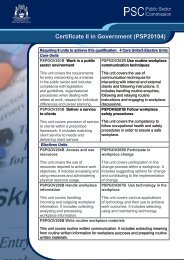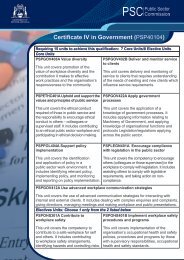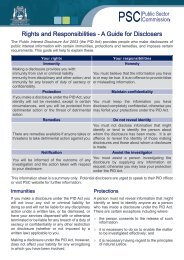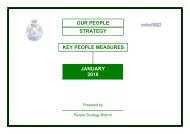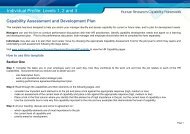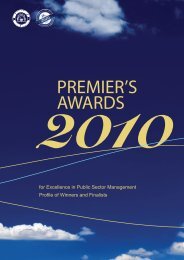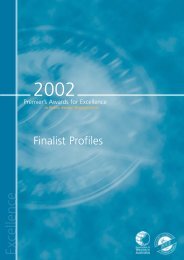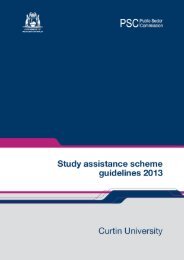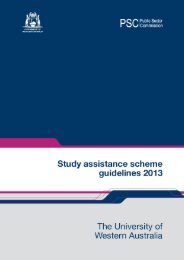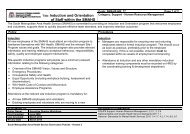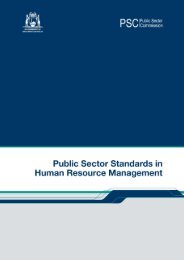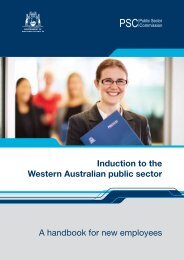Conduct guide - Public Sector Commission - The Western Australian ...
Conduct guide - Public Sector Commission - The Western Australian ...
Conduct guide - Public Sector Commission - The Western Australian ...
- No tags were found...
Create successful ePaper yourself
Turn your PDF publications into a flip-book with our unique Google optimized e-Paper software.
GOVERNMENT OFWESTERN AUSTRALIA<strong>Conduct</strong> <strong>guide</strong>
Enquiries:<strong>Public</strong> <strong>Sector</strong> <strong>Commission</strong>Dumas House, 2 Havelock Street, West Perth 6005Locked Bag 3002, West Perth WA 6872Telephone: (08) 6552 8888 Fax: (08) 6552 8710Email: admin@psc.wa.gov.auWebsite: www.publicsector.wa.gov.au© State of <strong>Western</strong> Australia 2012<strong>The</strong>re is no objection to this publication being copied in whole or part, provided there is due acknowledgement of anymaterial quoted or reproduced from the publication. Published by the <strong>Public</strong> <strong>Sector</strong> <strong>Commission</strong> (<strong>Western</strong> Australia),July 2012. Copies of this publication are available on the <strong>Public</strong> <strong>Sector</strong> <strong>Commission</strong> website at www.publicsector.wa.gov.au.Disclaimer<strong>The</strong> <strong>Western</strong> <strong>Australian</strong> Government is committed to quality service to its customers and makes every attempt to ensureaccuracy, currency and reliability of the data contained in these documents. However, changes in circumstances after timeof publication may impact the quality of this information. Confirmation of the information may be sought from originatingbodies or departments providing the information.AccessibilityCopies of this document are available in alternative formats upon request.2Section Heading<strong>Conduct</strong> <strong>guide</strong>
IntroductionTo ensure the community and government have confidence in the public sector, employeesmust act—and be seen to act—with integrity.Each public sector body’s code of conduct communicates the expected standards ofconduct and integrity to employees. <strong>The</strong> <strong>Public</strong> <strong>Sector</strong> Management Act 1994 s9(a)(iii)requires public sector bodies and their employees to comply with the provisions of anycode of conduct applicable to the public sector body or employee concerned.PurposeTo assist public sector integrity the <strong>Commission</strong>er has issued a <strong>Commission</strong>er’s InstructionNo. 8 – Codes of <strong>Conduct</strong> and Integrity Training (Instruction 8). This instruction requires allpublic sector bodies to develop, implement and promote a code of conduct and ensurecompliance with that code.This <strong>guide</strong> is a resource that will assist public sector bodies to develop or review theircodes. <strong>The</strong> <strong>guide</strong> does not replace the need for a public sector body to identify andincorporate their own legislative and conduct and integrity requirements.StructureAreas of conductIn accordance with Instruction 8 all codes of conduct must address seven areas. <strong>Public</strong>sector bodies can choose how to write and present their code in consideration of theseareas. Codes of conduct are also to be consistent with the principles of theCode of Ethics established by the <strong>Public</strong> <strong>Sector</strong> <strong>Commission</strong>er.<strong>The</strong> seven areas are:a) personal behaviourb) communication and official informationc) fraudulent and corrupt behaviourd) use of public resourcese) record keeping and use of informationf) conflicts of interest and gifts and benefitsg) reporting suspected breaches of the code.<strong>Conduct</strong> <strong>guide</strong> Introduction 3
Section oneDescribes the types of issues and conduct expectations a public sector body’s code ofconduct can include and discusses what policies and activities may support a public sectorbody’s code. When developing or reviewing a code of conduct public sector bodies shouldcheck the specific provisions of any applicable legislation to make sure their code reflectsthe objectives intended by Parliament.<strong>Public</strong> sector bodies also need to ensure they identify and address the risks associatedwith their work when setting their code of conduct.Section twoCodes of conduct should take into account the mandatory requirements that are commonacross the sector. <strong>The</strong>se include, but are not limited to: Legislation, <strong>Commission</strong>er’sInstructions, Premier’s Circulars, <strong>Public</strong> <strong>Sector</strong> <strong>Commission</strong>er’s Circulars and Treasurer’sInstructions.4Introduction<strong>Conduct</strong> <strong>guide</strong>
APersonal behaviourSection oneIssues and conduct expectations which should be addressedin codes of conduct• Act honestly and with integrity in the performance of duties• Not engage in harassment, bullying or discrimination against colleagues or members ofthe public• Maintain and contribute to a safe and productive work environment• Treat members of the public and colleagues with respect, courtesy, honesty andfairness, having proper regard for their interests, rights, safety and welfare• Make decisions fairly, impartially and promptly, and consider all available information,legislation, policies and procedures• Serve the government of the day professionally and impartially and provide timely, wellconsideredinformation and policy advice• Consequences of misconduct and actions which may be taken if the code and orassociated policies are not complied with.<strong>Conduct</strong> <strong>guide</strong> Personal behaviour 5
Policies and activitiesPolicies and activities that support a public sector body’s standards of conduct and integrity.• Policies covering:––equal opportunity and diversity and the prevention of discrimination andharassment––occupational health and safety––police clearance and working with children checks where appropriate, includingwhat may occur if an employee commits a criminal offence during employment––the need to notify the employing authority where essential job requirements areat risk, which may include suspension of or change to professional registration,accreditation, licence or qualifications––customer service, which may include a customer service charter andinformation on response times and how to manage difficult customers––the receipt and management of customer complaints• Job description forms/role statements which outline the public sector body values andconduct expectations• Establishing systems to monitor compliance with the code of conduct and associatedpolicies, for example audit and reporting systems.6Personal behaviour<strong>Conduct</strong> <strong>guide</strong>
Section twoLegislation• <strong>Public</strong> sector body’s enabling legislation (if any)• <strong>Public</strong> <strong>Sector</strong> Management Act 1994 (PSM Act)––Section 7: <strong>Public</strong> administration and management principles––Section 8: Human resource management principles––Section 9: Principles of conduct by public sector bodies• Corruption and Crime <strong>Commission</strong> Act 2003• Criminal Code––Chapter XIII: Corruption and Abuse of Office• Financial Management Act 2006• Equal Opportunity Act 1984• Occupational Safety and Health Act 1984• Industrial Relations Act 1979• Working with Children (Criminal Record Checking) Act 2004Across government requirements• Code of Practice: occupational safety and health in the <strong>Western</strong> <strong>Australian</strong>public sector (<strong>Public</strong> <strong>Sector</strong> <strong>Commission</strong>er’s Circular 2009-11)Promotes strategies to help CEOs, managers and employees improve the workenvironment and ensure compliance with the Occupational Safety and Health Act 1984.• Coordination of public sector labour relations (Premier’s Circular 2009/01)Comply with the coordination framework for labour relations, including circularsissued by the Department of Commerce available at www.commerce.wa.gov.au/LabourRelations.• State Government access <strong>guide</strong>lines for information, services and facilities(Premier’s Circular 2003/08)<strong>Public</strong> sector bodies to fulfil social and legislative responsibilities by ensuring serviceaccessibility by all customers, including people with disabilities.• Whole of government complaints management strategy (<strong>Public</strong> <strong>Sector</strong><strong>Commission</strong>er’s Circular 2009-27)<strong>Public</strong> sector bodies’ complaints management systems must conform to <strong>Australian</strong>Standard ISO 10002-2006.<strong>Conduct</strong> <strong>guide</strong> Personal behaviour 7
• Workforce planning and diversity in the public sector (<strong>Public</strong> <strong>Sector</strong><strong>Commission</strong>er’s Circular – 2011-02)<strong>Public</strong> sector bodies are required to prepare and implement an Equal EmploymentOpportunity Management Plan.• Implementation of the policy framework for substantive equality (<strong>Public</strong> <strong>Sector</strong><strong>Commission</strong>er’s Circular 2009-23)Aims to eliminate racial discrimination in public sector services and promote sensitivityto different client groups.• Codes of conduct and integrity training (<strong>Commission</strong>er’s Instruction No. 8)Requires all public sector bodies to have a code of conduct and ensure Accountableand Ethical Decision Making Training is provided to employees.• Code of Ethics (<strong>Commission</strong>er’s Instruction No. 7)Outlines the minimum standards of conduct and integrity to be complied with by allpublic sector bodies and employees.• <strong>Public</strong> sector standards in human resource management(www.publicsector.wa.gov.au/document/standards-human-resource-management)8Personal behaviour<strong>Conduct</strong> <strong>guide</strong>
BCommunication andofficial informationSection oneIssues and conduct expectations which should be addressedin codes of conduct• Non-disclosure of official information or documents acquired in the course ofemployment, other than as required by law or where proper authorisation is given• Not to misuse official information for personal gain or commercial gain for themselves orothers.Policies and activitiesPolicies and activities that support a public sector body’s standards of conduct and integrity.• Official communication, including identifying who is authorised to make comment onbehalf of the public sector body to the media or outside organisations• <strong>The</strong> use of social media in an official capacity• How and when information may be released, including public access to documentswhere appropriate, Freedom of Information and making general information availablethrough the public sector body’s website• Protection of intellectual property, using and granting permission to use intellectualproperty• Customer privacy and security of personal information• Establishing systems to monitor compliance with the code and associated policies, forexample, audit and reporting processes.<strong>Conduct</strong> <strong>guide</strong> Communication and official information 9
Section twoLegislation<strong>Public</strong> sector body’s enabling legislation (if any)• Corruption and Crime <strong>Commission</strong> Act 2003• Criminal Code––Chapter XII Disclosing official secrets··Section 81: Disclosing official secrets––Chapter XIII: Corruption and Abuse of Office• <strong>Public</strong> <strong>Sector</strong> Management Act 1994––Section 8(2): Human resource management principles - For certain matters thedepartment or organisation is not subject to the direction of a Minister––Section 9: Principles of conduct by public sector bodies – Act with integrity inthe performance of official duties and are to be scrupulous in the use of officialinformation, equipment and facilities––Section 74: Relationship between ministerial officers etc. and employees ofdepartments• <strong>Public</strong> Service Regulations 1988––Regulation 8: <strong>Public</strong> Comment• Financial Management Act 2006––Section 81: Actions etc. inhibiting etc. Minister’s parliamentary functionsprohibited• Freedom of Information Act 1992• State Records Act 200010Communication and official information<strong>Conduct</strong> <strong>guide</strong>
Across government requirements• Communication arrangements between Ministers and agencies(<strong>Public</strong> <strong>Sector</strong> <strong>Commission</strong>er’s Circular 2009-10)Section 74 of the PSM Act outlines Ministers’ responsibilities for how communicationsare made between ministerial staff and employees.• Contact with lobbyists and register of lobbyists(<strong>Public</strong> <strong>Sector</strong> <strong>Commission</strong>er’s Circular 2009-13)Lobbying is only permitted by those listed in the lobbyist register.• Information for Ministers, Ministerial staff and public sector employees calledas witnessesbefore the Corruption and Crime <strong>Commission</strong>(<strong>Public</strong> <strong>Sector</strong> <strong>Commission</strong>er’s Circular 2009-15)Guidelines for reimbursement of legal costs incurred by eligible witnesses, whereappropriate.• Government intellectual property (<strong>Public</strong> <strong>Sector</strong> <strong>Commission</strong>er’s Circular 2009-30)Outlines protection, management, use and commercialisation of intellectual property.• Guidelines for dealing with Cabinet documents under the Freedom ofInformation Act 1992 (Premier’s Circular 2003/09)• Official information (Administrative Instruction 711)An officer shall not, except in the course of the officer’s official duty and with the expresspermission of the chief executive officer, disclose certain information.• Official communications (Administrative Instruction 102)Unless in the course of official duties or with the express permission of the chiefexecutive officer, an officer shall not communicate with a Minster of the Crown, the<strong>Commission</strong>er or with the chief executive officer of another department; and coversrequests for information from Ministers administering a department.• Media and public communications (Administrative Instructions 728)Chief executive officers will determine which officers shall be authorised to make publiccomments. Instruction explains how public comment is made by authorised officers.<strong>Conduct</strong> <strong>guide</strong> Communication and official information 11
CFraudulent andcorrupt behaviourSection oneIssues and conduct expectations which should be addressedin codes of conduct• Not engage in fraud and corruption. Fraud is a dishonest activity that causes actual orpotential financial loss to any person or public sector body. Corrupt conduct occurswhen an employee uses or attempts to use their position for personal advantage.Policies and activitiesPolicies and activities that support a public sector body’s standards of conduct and integrity.• Risk management plans• Developing corruption resistance policies and codes of conduct in consideration of theIntegrity Coordinating Group’s products• Clear employee reporting mechanisms (see the ‘Reporting suspected breaches of thecode’ section of this <strong>guide</strong> for more information)• Establishing systems to monitor compliance with the code and associated policies, forexample, audit and reporting processes.12<strong>Conduct</strong> <strong>guide</strong>Fraudulent and corrupt behaviour
Section twoLegislation• <strong>Public</strong> sector body’s enabling legislation (if any)• <strong>Public</strong> <strong>Sector</strong> Management Act 1994––Section 9: Principles of conduct by public sector bodies – Act with integrity inthe performance of official duties and are to be scrupulous in the use of officialinformation, equipment and facilities• Corruption and Crime <strong>Commission</strong> Act 2003––Section 4: Misconduct• Financial Management Act 2006• Criminal Code––Chapter XIII: Corruption and Abuse of Office• Treasurer’s Instructions• State Records Act 2000 (Record Keeping Plan)• Statutory Corporations (Liability of Directors) Act 1996• <strong>Public</strong> Interest Disclosure Act 2003Across government requirements• Risk management and security (Treasurer’s Instruction – 825)<strong>Public</strong> sector bodies should safeguard assets from misuse and loss due to theft ordamage.• Code of Ethics (<strong>Commission</strong>er’s Instruction No. 7)Outlines the minimum standards of conduct and integrity to be complied with by allpublic sector bodies and employees.• Codes of conduct and integrity training (<strong>Commission</strong>er’s Instruction No. 8)Requires all public sector bodies to have a code of conduct and ensure Accountableand Ethical Decision Making Training is provided to employees.Fraudulent and corrupt behaviour<strong>Conduct</strong> <strong>guide</strong>13
DUse of public resourcesSection oneIssues and conduct expectations which should be addressedin codes of conduct• Obligation to be accountable for expenditure. This may include the use of public moneyfor hospitality and travel• Use the resources of the state with diligence and efficiency, including office facilities andequipment, vehicles and cab charge vouchers• Not use public resources for party political work or for private financial gain• Follow legislation and procurement policies to engage contractors and suppliers• Purchase goods and services following the public sector body’s and governmentpolicies.Policies and activitiesPolicies and activities that support a public sector body’s standards of conduct and integrity.• Policies covering:––use of corporate credit cards––when resources are not to be used (e.g. for private business or political work)––any permitted private use of, for example, office phones, Internet - is to belimited and not interfere with work• Establishing systems to monitor compliance with the code and associated policies, forexample, audit and reporting processes.14<strong>Conduct</strong> <strong>guide</strong>Use of public resources
Section twoLegislation• <strong>Public</strong> sector body’s enabling legislation (if any)• <strong>Public</strong> <strong>Sector</strong> Management Act 1994––Section 7: <strong>Public</strong> administration and management principles––Section 9: Acting with integrity when performing official duties, being scrupulousin the use of official information, equipment and facilities• Financial Management Act 2006• State Supply <strong>Commission</strong> Act 1991• Corruption and Crime <strong>Commission</strong> Act 2003––Section 4: Misconduct• Industrial Awards and Agreements (for example, living away from home allowance, mealand travel allowances)• Criminal Code––Chapter XIII: Corruption and Abuse of OfficeAcross government requirements• Guidelines for official travel (Premier’s Circular 2009/04)Guidance for official air travel arrangements, includes information regarding frequentflyer programs.• Guidelines for expenditure on official hospitality(<strong>Public</strong> <strong>Sector</strong> <strong>Commission</strong>er’s Circular 2009-18)Establishes criteria for accountability of expenditure, defines official hospitality, workingmeals and outlines hospitality principles.• Department of Commerce Circular to Departments and Authorities: No 1 of2005 Policies on Payment of Overseas Travelwww.commerce.wa.gov.au/LabourRelations• Eligibility of government officers for payment of fees for government boardsand committees (Premier’s Circular 2010/02)Outlines payment of fees to government officers.• Government advertising and communications policy(<strong>Public</strong> <strong>Sector</strong> <strong>Commission</strong>er’s Circular 2009-07)Campaign and non-campaign advertising.Use of public resources<strong>Conduct</strong> <strong>guide</strong>15
• Office accommodation policies and the Government Office AccommodationWorking Group (<strong>Public</strong> <strong>Sector</strong> <strong>Commission</strong>er’s Circular 2009-17)Guide to procurement and management of government office accommodation.• Custody of public property (Treasurer’s Instructions – 406)Describes asset register requirements.• Motor vehicles (Treasurer’s Instructions – 411)Describes use of government vehicles and record-keeping requirements.• Purchasing cards (Treasurer’s Instruction – 321)Describes credit card use.• Government fleet policy and <strong>guide</strong>lines www.treasury.wa.gov.au• State Supply <strong>Commission</strong> Procurement Policies including Buy Local – Value forMoney (www.ssc.wa.gov.au)• Whole of Government Contracts WA (www.contractswa.finance.wa.gov.au)16<strong>Conduct</strong> <strong>guide</strong>Use of public resources
ERecord keeping anduse of informationSection oneIssues and conduct expectations which should be addressedin codes of conduct• Record actions and decisions to ensure transparency• Ensure the secure storage of sensitive or confidential information• How and when information may be released• Ensure personal information is accurate, complete, up to date and not misleading.Policies and activitiesPolicies and activities that support a public sector body’s standards of conduct and integrity.• Record keeping plan• A policy outlining how records are to be kept and the requirements for removing filesfrom the office; for example, working from home or using electronic devices• A policy that ensures the secure and proper disposal of government documents andhard drives• Release of information policies (may include freedom of information)• Establishing systems to monitor compliance with the code and associated policies, forexample, audit and reporting processes.<strong>Conduct</strong> <strong>guide</strong> Record keeping and use of information 17
Section twoLegislation• <strong>Public</strong> sector body’s enabling legislation (if any)• State Records Act 2000––Record Keeping Plans• <strong>Public</strong> <strong>Sector</strong> Management Act 1994––Section 7: <strong>Public</strong> administration and management principles• <strong>Public</strong> <strong>Sector</strong> Management (General) Regulations 1994––Personnel records prescribed• <strong>Western</strong> <strong>Australian</strong> Industrial Relations Act 1979––Section 49(d): Keeping of employment records• Freedom of Information Act 1992• Financial Management Act 2006• State Supply <strong>Commission</strong> Act 1991• Library Board of <strong>Western</strong> Australia Act 1951• Corruption and Crime <strong>Commission</strong> Act 2003• Criminal Code––Chapter XIII Section 81: Falsification of recordsAcross government requirements• Policy framework and standards for information sharing between governmentAgencies (<strong>Public</strong> <strong>Sector</strong> <strong>Commission</strong>er’s Circular 2009-29)Facilitates the structures for sharing of information.• Requirements for <strong>Western</strong> <strong>Australian</strong> Government publications and librarycollections (Premier’s Circular 2003/17)Outlines requirements to lodge publications with state and national libraries.• Employment records (Treasurer’s Instructions – 501)Employment record maintenance.• Record of attendance and time worked – maintenance of employee attendancerecords (Treasurer’s Instruction – 502)18Record keeping and use of information<strong>Conduct</strong> <strong>guide</strong>
FConflicts of interest andgifts and benefitsSection oneIssues and conduct expectations which should be addressedin codes of conduct• Responsibility to identify, declare and manage conflicts of interest in the public interest.Conflicts of interest arise where there is a conflict between the performance of publicduty and private or personal interests. Conflicts may involve personal, financial orpolitical interests and may be perceived, potential or actual• Conflict situations may result from the holding of shares, business interests, secondaryemployment, family relationships, private affiliations, sponsorship and the receipt of giftsand benefits• What gifts and benefits, if any, can be received and the requirement to report/registerthe receipt of gifts and benefits.<strong>Conduct</strong> <strong>guide</strong> Conflicts of interest and gifts and benefits 19
Policies and activitiesPolicies and activities that support a public sector body’s standards of conduct and integrity.• Procedures for identifying, declaring and managing conflicts of interest (perceived,potential or actual). <strong>The</strong>se should include examples specific to the public sector body,for example, relationships with contractors and include what action is required tomanage a conflict• Policies about the receipt of and the offering of gifts and benefits. Polices shouldinclude whether gifts can be accepted at all and when it is not appropriate to acceptgifts. Policies should also outline what gifts can never be accepted, for example, cashor gifts easily converted to cash. If gifts and benefits can be received policies shouldensure gifts are of a token nature only and it is clear they are property of the publicsector body not the employee• Policies about conflicts of interest and the receipt of and offering of gifts andbenefits should reference any legislation which prohibits decision making in certaincircumstances• A register to record all gifts and benefits received by employees or given by employees,public sector bodies may also wish to record gifts offered• Guidelines to provide to tenderers and contractors to inform them about the publicsector body’s gifts and benefits policy and code of conduct• Policies about public sector employees nominated as candidates for state and federalelection• Secondary employment policies and approval processes• Establishing systems to monitor compliance with the code and associated policies, forexample, audit and reporting processes• Monitoring gift registers to identify areas of risk or emerging trends within a publicsector body.20Conflicts of interest and gifts and benefits<strong>Conduct</strong> <strong>guide</strong>
Section twoLegislation• <strong>Public</strong> sector body’s enabling legislation (if any)• <strong>Public</strong> <strong>Sector</strong> Management Act 1994––Section 102: Employees not to be employed outside Government etc. withoutpermission• Electoral Act 1907• Electoral Regulations 1996––Section 28(3): <strong>Public</strong> employees standing for election• <strong>Australian</strong> Constitution––Section 44: Disqualification, officers of the crown standing for federal elections• Financial Management Act 2006• Corruption and Crime <strong>Commission</strong> Act 2003––Section 4: Misconduct• <strong>Public</strong> Interest Disclosure Act 2003• Criminal Code––Chapter XIII: Corruption and Abuse of Office··Section 82: Bribery of a public officer··Section 83: Corruption··Section 88: Bargaining for public officeAcross government requirements• Integrity Coordinating Group Conflict of Interest Guidelines• Codes of conduct and integrity training (<strong>Commission</strong>er’s Instruction No. 8)Requires all public sector bodies to have a code of conduct and ensure Accountableand Ethical Decision Making Training is provided to their employees.• Contact with lobbyists and register of lobbyists (<strong>Public</strong> <strong>Sector</strong> <strong>Commission</strong>er’sCircular 2009-13)Lobbying is only permitted by those listed in the lobbyist register.• Account for public money, statutory authority money and other money (moneyheld in trust) www.treasury.wa.gov.auMoney received by a public sector body that may be categorised as general money isto be accounted for.• Self-Managed Superannuation Funds (SMSF) - Outside Employment (<strong>Public</strong><strong>Sector</strong> <strong>Commission</strong>er’s Circular: 2012-02)<strong>Conduct</strong> <strong>guide</strong> Conflicts of interest and gifts and benefits 21
GReporting suspectedbreaches of the codeSection oneIssues and conduct expectations which should be addressedin codes of conduct• Code includes an expectation that suspected breaches will be reportedPolicies and activitiesPolicies and activities that support a public sector body’s standards of conduct and integrity.• Develop a reporting framework that includes:––how reports of potential breaches of the code can be made––expectations about the type of information that may be reported––rights and responsibilities of those reporting––who can receive reports of suspected breaches of the code within the publicsector body. <strong>The</strong>se could include internal standards or integrity branches, aconfidential ethics line, line managers, human resource officers and the publicsector body’s <strong>Public</strong> Interest Disclosure (PID) Officer––ensuring those identified to receive a report understand their obligations whenthey receive reports and have the skills to appropriately deal with or refermatters––promoting reporting avenues to employees to ensure they know how to reportsuspected breaches of the code of conduct––support that is available to employees who report instances of suspectedbreaches of the code.22<strong>Conduct</strong> <strong>guide</strong>Reporting suspected breaches of the code
Section twoLegislation• <strong>Public</strong> sector body’s enabling legislation (if any)• <strong>Public</strong> <strong>Sector</strong> Management Act 1994––Section 9(a): Comply with the provisions of any code of conduct applicable tothe public sector body or employee concerned• Corruption and Crime <strong>Commission</strong> Act 2003––Part 3 - Misconduct Section 25: Any person may report misconduct––Part 3 - Misconduct Section 28: Certain officers obliged to notify misconduct• Occupational Safety and Health Act 1984• <strong>Public</strong> Interest Disclosure Act 2003Across government requirements• Codes of conduct and integrity training (<strong>Commission</strong>er’s Instruction No 8)Requires all public sector bodies to have a code of conduct, all codes must addressseven areas including reporting suspected breaches of the code.• Code of Practice: Occupational Safety and Health in the <strong>Western</strong> <strong>Australian</strong>public sector (<strong>Public</strong> <strong>Sector</strong> <strong>Commission</strong>er’s Circular 2009-11)• Obligation to report shortages and surpluses of money(Treasurer’s Instruction 803)Reporting suspected breaches of the code<strong>Conduct</strong> <strong>guide</strong>23
Other resourcesPersonal behaviour• <strong>The</strong> <strong>Commission</strong> for Occupational Safety and Health <strong>Western</strong> Australiawww.commerce.wa.gov.au publishes a Code of Practice on the prevention andmanagement of workplace bullying available at www.commerce.wa.gov.au/worksafe/PDF/Codes_of_Practice/Code_violence.pdf and a Guidance Note on dealing withbullying atwww.commerce.wa.gov.au/worksafe/PDF/Guidance_notes/Dealing with bullying.pdf• To help develop recruitment policies which prevent discrimination refer to the <strong>Public</strong><strong>Sector</strong> <strong>Commission</strong>’s website (www.publicsector.wa.gov.au) or the Equal Opportunity<strong>Commission</strong>’s publication ‘Are You Getting it Right’www.eoc.wa.gov.au/<strong>Public</strong>ations• State Government Access Guidelines for Information Services and Facilities availablefrom the Disability Services <strong>Commission</strong> at www.disability.wa.gov.au• Information on the working with children check and legislation atwww.checkwwc.wa.gov.au• Information on political impartiality is available from www.publicsector.wa.gov.au/icg• Integrity in decision making www.publicsector.wa.gov.au/icg• Information on raising and handling a complaint is available fromwww.ombudsman.wa.gov.auCommunication and official information• Office of the Information <strong>Commission</strong>er’s website www.foi.wa.gov.au• Information on cabinet confidentiality is available from www.dpc.wa.gov.au24<strong>Conduct</strong> <strong>guide</strong>Other resources
Fraudulent and corrupt behaviour• <strong>Australian</strong> Standard Fraud and Corruption Control AS 8001 can be purchased atwww.standards.com.au• Australia/New Zealand Standard on risk management AS/NZS 4360www.riskmanagement.com.au• Corruption and Crime <strong>Commission</strong>’s publications www.ccc.wa.gov.au• <strong>Public</strong> Interest Disclosures www.publicsector.wa.gov.auUse of public resources• <strong>Western</strong> <strong>Australian</strong> Financial Administration Bookcase - includes Financial ManagementAct 2006, Treasurer’s Instructions, Accounting Policy Guidelines and more atwww.treasury.wa.gov.au• State Supply <strong>Commission</strong> Policies at www.ssc.wa.gov.au• Government Procurement – Common Use Agreements at www.finance.wa.gov.au• <strong>Public</strong> <strong>Sector</strong> <strong>Commission</strong> Guidelines to assist public sector bodies in developing email,social media and/or internet use policies www.publicsector.wa.gov.auRecord keeping and use of information• State Records Office website www.sro.wa.gov.au• Office of the Information <strong>Commission</strong>er’s website www.foi.wa.gov.au• Information on Good Record Keeping is available from www.ombudsman.wa.gov.au• Auditor General reports and publications are available from www.audit.wa.gov.auConflicts of interest and gifts and benefits• Integrity Coordinating Group Conflict of Interest Guidelines atwww.publicsector.wa.gov.au/icg• Auditor General reports and publications are available from www.audit.wa.gov.au• State Services Authority of Victoria for gifts and benefits informationwww.ssa.vic.gov.au• Crime and Misconduct <strong>Commission</strong> of Queensland for gifts and benefits informationwww.cmc.qld.gov.auOther resources<strong>Conduct</strong> <strong>guide</strong>25
Reporting a suspected breach of the code• Whistling While <strong>The</strong>y Work: a good practice <strong>guide</strong> for managing internal reporting ofwrongdoing in public sector organisations http://epress.anu.edu.au?p=144611• Crime and Misconduct <strong>Commission</strong> of Queensland www.cmc.qld.gov.auCirculars and instructions• <strong>Public</strong> <strong>Sector</strong> <strong>Commission</strong>er’s Instructions and Circulars atwww.publicsector.wa.gov.au• Administrative Instructions at www.publicsector.wa.gov.au/publications-resources/instructions-standards-and-circulars/administrative-instructions• Department of Commerce Circulars at www.commerce.wa.gov.au/LabourRelations/PDF/Circulars/circulars.htm• Premier’s Circulars at www.dpc.wa.gov.au/GuidelinesAndPolicies/PremiersCirculars/Pages/Default.aspx• Treasurer’s Instructions – Financial Administration Bookcase atwww.treasury.wa.gov.au26<strong>Conduct</strong> <strong>guide</strong>Other resources



